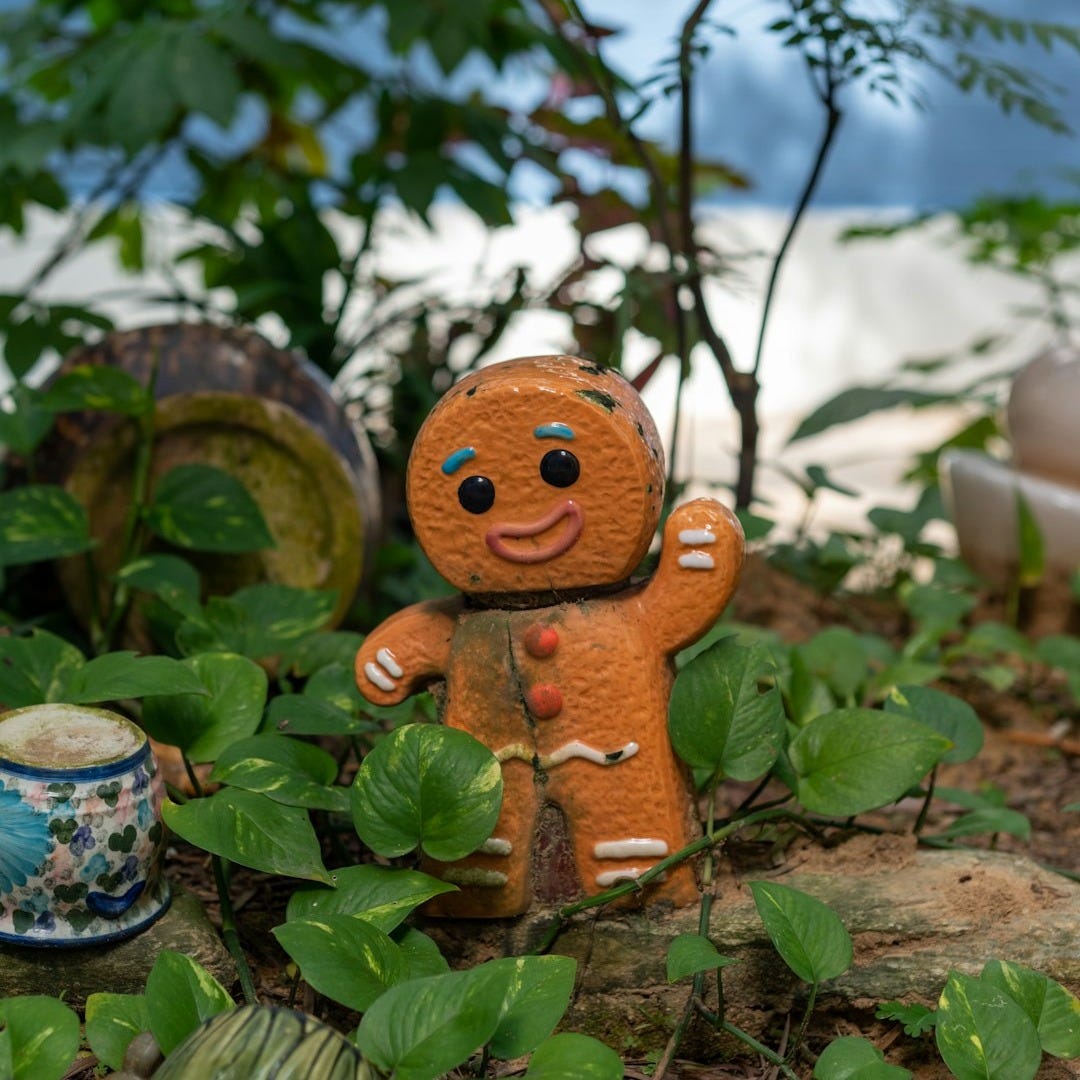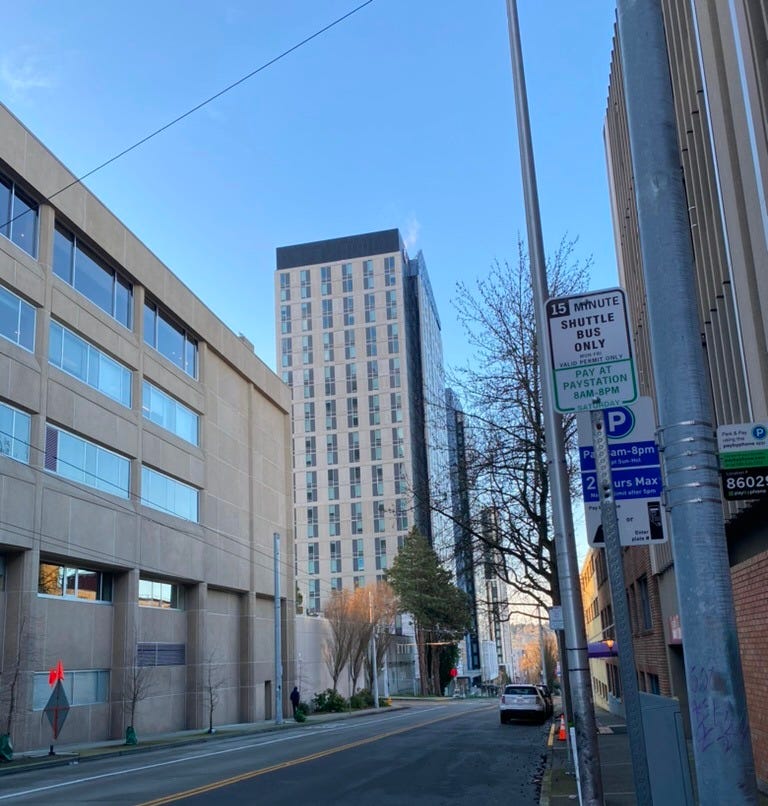
Yesterday was hard, so I bought a book. Did the mended gingerbread man on the cover draw me in? I have stories about a gingerbread man—it was a puzzle, not an actual one. But the story itself always felt viable—like, “It is too hot here so I am going to run away.” Sadly, I am a responsible adult human and I can’t allow myself to do that. Instead, I feel like I am limping on crutches. And no, life is certainly not fair so I bought the book and hope it doesn’t turn out to be some positive bypass. That would be irritating. (Grammarly asked if I wanted to change this wording to sound less negative. Even technology wants us to be positive all the time. Sigh!)
Yesterday was especially hard. Not that we hadn’t been warned, but that I dared to believe that Scott could receive a liver donation on the first try. The call came, I managed to navigate the early morning shuttle (only got on one wrong bus), Scott was prepped, family arrived, and then the doctor walked in with the bad news. The anesthesiologist said his sodium was too low and the liver was given to the second person—who was also prepped and hoping it didn’t work out for the first person. If Scott had been second in line, I would have hoped that too.
My family took one look at me after the discouraging news and drove me back to the hospitality house for a nap that turned into a day off as they stayed by their father’s disappointed and sick side. I told the doctor, “You warned us of this, we just wish we had known early this morning when the decision was made.” Yes, I shot the messenger who had no control over this. I then apologized because he had been the most caring of all the dozens of doctors who had walked through the room.
I somehow avoided sitting on the floor and crying and let my children send me for a nap. I needed a nap.
“So what do you do? You have all these things piling on, and you don’t know how much more you can carry before the bag breaks and everything drops all over the ground and rolls across the parking lot. You didn’t choose these things; you weren’t prepared. If you’d known what was coming, you would’ve done more cardio or taken more vitamins, maybe hidden money under the mattress or run screaming out of the building. This wasn’t the plan. And it’s bad and it’s hard and you’re tired. It’s not fair” (pp. 13-14).
This is hard and I am tired. Pathologically. And I wish I had been more prepared for this particular stay at the hospital. I am grateful for how well my friend helped me pack but I did not expect to not return home again—something that will probably not happen for months.
I have one small suitcase, a backpack, a bag of food, and now Livvy the stuffed chicken. (That sounds more like food than a companion.) Remarkably, there isn’t much that I wish I had brought. Traveling light is important in a crisis. But I would like a do-over because I would have brought more of several things. And my wardrobe which is almost completely black and gray is looking a bit tired on these beautiful spring days.
Back to the book . . . “You didn’t choose these things; you weren’t prepared.” No, a liver transplant was not on my Bingo card for 2025 but honestly, how would someone even prepare for that? Sadly, I spent my life working hard to be prepared for a vast array of bad things that might happen. I had finally relaxed enough to believe that was only catastrophic thinking when I woke up in a Groundhog Day nightmare and continued getting up and going to the hospital and watching my husband suffer. Day after day, after day.
“And it’s bad and it’s hard and you’re tired. It’s not fair.”
So, I went and took a nap—but now it is morning and I am working on catching the shuttle and going to sit in the most uncomfortable chairs by Scott’s bed for another day. I just have less enthusiasm for hope. Not that I don’t have hope—a liver will come. I am just less enthusiastic about the hope.
I decided to turn the page in the book and read more . . . the author said,
“If I’m not careful, I can be ridiculously depressing. Who wants to hear about someone else’s shattering disappointments when we’re all up to our eyebrows in our own? Or worse, my life will seem like kindergarten to you. Like the preschool of pain, when you’re deep into a PhD dissertation on ‘The Absolute Worst Thing That Anyone Has Ever Dealt With.’ ” (p. 15).
I laughed at the PhD reference. I have one of those and it pales in comparison to the real-life dissertations I have written about how absolutely wrong life can go. My life isn’t the only one like that. I listen to the stories others share with me and it is no wonder so many of us are waiting for the other shoe to drop. Shoes do drop. Trust me on that one.
I have spent a lot of time thinking about all this while my back complained about the chairs. I have lived in faith circles where bad things happening were attributed to a.) not trusting God enough, b.) having some hidden sin, c.) God helping us build character.
Nothing on that a,b,c list is helpful to those who suffer—especially to those who suffer at the hands of others or simply because of the randomness of life. Scott’s story is random. It is about the damage to his liver caused by Hepatitis B he contracted when pulling people from a car wreck. The truth is—life does go wrong and there is no one to blame and no redeeming purpose except for who we choose to become as a result. In this, I find God to be my trustworthy companion.
After the frustrating news, Scott said, “I need a minute to be sad and then I will be OK.” I said, “Take a day, take a week, just be sad. No one is telling you not to be sad.” And yet, during our lifetime, plenty of people told us not to be sad. We tell others not to be sad because their sadness causes us discomfort. We need to be uncomfortable! Being uncomfortable about another’s sadness is called empathy and we all need to embrace it (certainly not call it a sin as some have done lately—God help us all!)
Every morning I stand at this shuttle stop with other people who are living their own personal Groundhog nightmares. Sometimes we talk to one another; sometimes we are silent. Either way, there is companionship in knowing that we are at the hospitality house for difficult reasons—and yet every one of us clings to hope.
The audacity of human hope will get me moving again this morning. The shuttle stop is calling me, but hope is slow this morning. When I am sitting, I will keep reading. More to come . . .






Janyne, your words hit me in the feels, with tears all the way through this. There are some plot twists in life we simply can't prepare for, or even expect. And while God is already there, we'll be your "alongsiders." Praying, caring, and thinking of you every day.
My heart goes out to you and Scott. Thanks for being real.